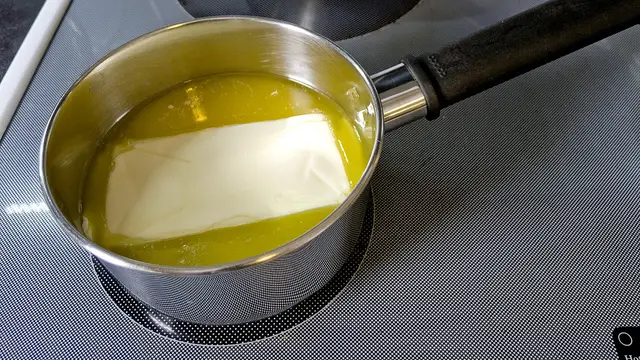You may not have heard a lot about ghee if you are from the United States or the Western world. However, it is becoming more and more popular as food choices expand around the world. Ghee originated in India and is popular in cooking and medicine in countries near India and also in some areas of Africa and the Middle East. In short, ghee is a type of clarified butter, but let’s take a closer look at what is ghee.
What Is Ghee?
Traditional butter consists of butterfat, milk solids, and water. Ghee is usually made from unsalted butter that has been heated to a liquid. During the heating process, the buttermilk solids separate to the bottom of the pan and brown. Additionally, any moisture that was in the butter evaporates out and is skimmed as a foam from the top of the pan. After the heating process is complete, the milk solids are strained away from the liquid leaving a golden color ghee. Essentially, the milk solid and water are removed, leaving the golden deliciousness of the butterfat. Ghee takes on a nutty flavor because of the browned milk solids that caramelize on the bottom of the pan.
While the ghee is a liquid when heated, it turns somewhat solid as it cools to room temperature and very hard when refrigerated. Refrigeration may make it difficult to scoop from the container, but it is perfectly acceptable to store ghee at room temperature in a cool, dark place for several months. The moisture and milk solids are really what would create spoilage. Since these are removed when ghee is made, room temperature spoilage is not a concern for some time.
[the_ad id=”3667″]
What Is Ghee Used For?
Ghee is used for cooking in the same ways you would use butter or oils. Essentially, you can cook or prepare any food with it that requires cooking oil or butter. It works great for frying or sauteing foods because of its ability to tolerate high heat. Ghee smokes at about 450°F so you have a lot of heating wiggle room before burn is a concern. It has a higher tolerance to heat in comparison to butter (350°F smoke point) because the milk solids are removed. Additionally, ghee has a higher smoke point than other fats/oils like extra virgin olive oil, canola oil, lard, coconut oil, and grapeseed oil.
How Is Ghee Different From Clarified Butter?
Both ghee and clarified butter remove the milk solids during processing, but it is done so in different ways. When making ghee, the milk solids brown (caramelize) on the bottom of the pan which creates its classic nutty flavor. The milk solids are not browned when making clarified butter so it is void of ghee’s nutty flavor.
What Is Vegetable Ghee?
Vegetable ghee may also be called vanaspati, imitation ghee, or artificial butter. It is commonly used as an alternative to traditional butter-based ghee as a cheaper option. It is typically made from various oils like palm, soybean, rapeseed and cottonseed. The taste and texture of vegetable ghee are designed to mimic traditional ghee.
Ghee Health Benefits
- Reduction of Heart Disease – Studies have shown that ghee may lower LDL (Bad) cholesterol and triglycerides while raising HDL (good) cholesterol. Additionally, a study of men living in rural areas of India found that men who consumed higher amounts of ghee had lower occurrences of heart disease.[1]
- Protect Against Cancer – A study found that “Cow ghee compared to soybean oil downregulates the enzyme activities responsible for carcinogen activation in liver and upregulates carcinogen detoxification activities in liver and mammary tissues.”[2]
- Lactose-Free – Because the milk solids are removed when ghee is made, virtually all of the lactose (milk sugar) is eliminated from the final product. This makes ghee suitable for consumption by many people who suffer from lactose intolerance or sensitivity.
- Casein-Free – Many people have difficulty with the casein protein found in dairy products. Casein has been known to produce allergic reactions for people with dairy allergies. Since the milk solids are removed, the casein protein is also removed. Depending on how the ghee is manufactured, there still can be trace amounts of casein that remain in the final product. People who are extremely allergic to dairy may still need to avoid ghee.
- Better Digestion – Ghee helps promote a healthier digestive system by stimulating the secretion of the acids in the stomach. This helps speed up the digestive process.
References:
1. http://www.ncbi.nlm.nih.gov/pubmed/9212571
2. http://www.ncbi.nlm.nih.gov/pubmed/23041740
Photo Source: Larry Jacobsen

